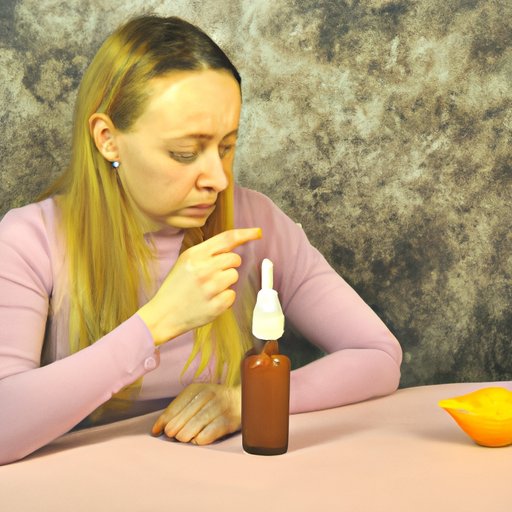
Introduction
Nasal congestion is a common problem that affects many people, especially during allergy season or when catching a cold. Regardless of the cause, nasal congestion can make breathing difficult and cause discomfort. This article aims to provide you with a comprehensive guide on how to clear nasal congestion, from home remedies to medical treatments and prevention tips.
The Basics of Nasal Congestion
Nasal congestion refers to the swollen or inflamed nasal tissues that obstruct airflow in and out of the nose. The most common causes of nasal congestion include allergies, infections, air pollution, and structural abnormalities.
The primary symptoms of nasal congestion include difficulty breathing through the nose, reduced sense of smell, and discharge from the nose. In some cases, nasal congestion may also lead to a headache, earache, or sore throat.
If you experience persistent or severe nasal congestion, it is recommended to see a healthcare provider for a proper diagnosis. The diagnosis may involve assessing your medical history, performing a physical exam, or recommending additional tests such as an allergy test or CT scan.
Home Remedies for Nasal Congestion
Many home remedies can help alleviate the symptoms of nasal congestion without the need for medical intervention. Here are some effective methods:
Steam Inhalation
Steam inhalation helps reduce nasal congestion by moisturizing the nasal passages and loosening up mucus. To do this, boil water in a pot or kettle, and then transfer it to a bowl. Place a towel over your head, close your eyes, and lean over the bowl, inhaling the steam for 5-10 minutes. You can also add essential oils such as eucalyptus or peppermint for additional benefits.
Nasal Irrigation
Nasal irrigation involves flushing out the nasal passages with a saline solution to remove excess mucus and allergens. You can use a neti pot or a bulb syringe to do nasal irrigation. Mix one teaspoon of salt and one teaspoon of baking soda in a quart of distilled water. Tilt your head to one side, and insert the spout of the neti pot into one nostril, and pour the solution through the nostril. The solution should come out of the other nostril. Repeat on the other side.
Hot Shower
Taking a hot shower can also ease nasal congestion by providing a steamy and humid environment that helps loosen mucus. Spend 10-15 minutes in a hot shower, taking deep breaths to inhale the steam.
Saline Nose Drops
Saline nose drops can help moisturize and clear the nasal passages. You can purchase saline drops from a pharmacy or make them at home by mixing one teaspoon of salt and one cup of warm water. Use a dropper to put a few drops of saline in each nostril. Repeat as needed.
The Benefits of Essential Oils
Essential oils have anti-inflammatory and decongestant properties that can relieve nasal congestion and improve breathing. However, it’s essential to use essential oils safely and correctly. Here are some steps to follow:
First, dilute essential oils with a carrier oil such as coconut or almond oil to prevent skin irritation. Second, add a few drops of essential oils to a bowl of hot water or a diffuser to inhale the scent. Some of the best essential oils for nasal congestion include peppermint, eucalyptus, tea tree, and lavender.
The Role of Diet and Hydration
What you eat and drink may also affect your nasal congestion. Foods that contain anti-inflammatory properties can help reduce inflammation, which is a common cause of nasal congestion. Such foods help in boosting the immune system and fighting against bacterial infections. They include:
- Broccoli
- Citrus fruits (Oranges, lemons, and grapefruits)
- Garlic
- Ginger
- Turmeric
Staying hydrated is also important to keep the nasal passages moist and prevent congestion. Drink plenty of water and fluids, such as hot tea, broth, and warm lemon water.
When to See a Doctor
If your nasal congestion persists for more than ten days or gets worse, it is essential to see a healthcare provider. Other symptoms that may warrant medical attention include:
- Facial pain or swelling
- Bleeding from the nose
- High fever
- Yellow or green discharge that persists for more than a week
A doctor may recommend prescription medications such as nasal steroid sprays, antihistamines, or decongestants to treat nasal congestion, depending on the cause and severity of the symptoms.
Medications for Nasal Congestion
Over-the-counter medications such as decongestants, antihistamines, and nasal sprays can help relieve nasal congestion. Decongestants like Phenylephrine or Pseudoephedrine work by shrinking the blood vessels in the nasal passages, thereby reducing swelling and congestion.
Antihistamines such as Loratadine or Cetirizine help reduce the inflammation triggered by an allergic reaction, which is a common cause of nasal congestion.
Nasal sprays, such as oxymetazoline, can help shrink the swollen nasal tissues and provide quick relief for up to 12 hours. However, the overuse of nasal sprays can lead to rebound congestion, so it’s essential to follow the instructions carefully.
Prevention Tips
Preventing nasal congestion means avoiding the triggers that cause it. Here are some helpful tips to follow:
- Avoid exposure to allergens and irritants such as pet dander, dust mites, and tobacco smoke
- Keep your home and workplace well-ventilated and clean
- Wash your hands regularly to minimize the risk of infections
- Change your bedding, pillows, and towels frequently
- Use a humidifier to keep the air moist and prevent dryness
- Avoid spicy foods that can irritate the nasal passages
Conclusion
Nasal congestion can be a nuisance, but there are many effective ways of treating and preventing it. Home remedies such as steam inhalation and nasal irrigation, coupled with essential oils and proper hydration and diet, can help provide relief in mild cases. For persistent or severe congestion, over-the-counter or prescription medication or seeing a healthcare provider is recommended.




